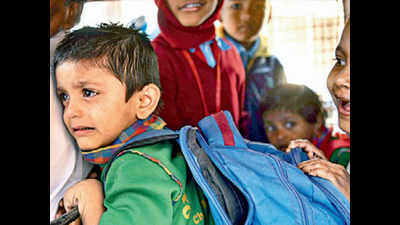- News
- City News
- mumbai News
- Nearly 47mn kids in India stunted due to poor hygiene
Trending
This story is from February 28, 2018
Nearly 47mn kids in India stunted due to poor hygiene
Four out of every 10 children under the age of five in India has stunted growth, according to statistics provided by the UNICEF. Every third child with stunted growth in the world lives in India, which is home to a total of nearly 47 million stunted children. The reason for this stunting, say experts, is chronic under-nutrition brought on repeated infections.

MUMBAI: Four out of every 10 children under the age of five in India has stunted growth, according to statistics provided by the UNICEF. Every third child with stunted growth in the world lives in India, which is home to a total of nearly 47 million stunted children. The reason for this stunting, say experts, is chronic under-nutrition brought on repeated infections.
Dr Anand Bang, a public health expert who works closely with the Maharashtra government, told TOI, “Poor sanitation, multiple episodes of sickness and poor consumption of food cause malnourishment among children.” He said it isn’t enough to focus only on meals and nutrition without paying attention to the other elements of child care—namely prevention of infections and their management.
Prevention could include simple but effective health interventions such as washing hands with soap, drinking clean water and using a clean toilet. Hindustan Unilever Limited (HUL), one of the largest fast moving consumer goods company as part of its Swachh Aadat, Swachh Bharat initiative, recently launched a new campaign to promote these three “swachh aadats’ or healthy hygiene habits in a country where one-third of its children fall ill repeatedly. The national campaign was flagged off by actor Kajol last month.
The need for ‘swachh aadats’ cannot be underlined enough. UNICEF data shows that 47% of Indians don’t wash hands with soap after defecation, and 523 million defecate in the open. About 67% of Indian households drink water that could be contaminated. In this backdrop, it is not surprising that life-threatening diseases like diarrhoea is rampant. “A child with diarrhoea will not be able to eat well which, in the long run, would worsen his malnutrition and increase his chances of getting another infection. A vicious cycle is thus created,” said Dr Bang. Health agencies estimate that up to 50% of all child malnourishment is due to the lack of safe drinking water, sanitation and hygiene (WASH) practices.
Public health campaigns like Swachh Aadat, Swachh Bharat initiative that focus on WASH Interventions have shown to significantly reduce diarrhoeal morbidity.
Dr Anand Bang, a public health expert who works closely with the Maharashtra government, told TOI, “Poor sanitation, multiple episodes of sickness and poor consumption of food cause malnourishment among children.” He said it isn’t enough to focus only on meals and nutrition without paying attention to the other elements of child care—namely prevention of infections and their management.
Prevention could include simple but effective health interventions such as washing hands with soap, drinking clean water and using a clean toilet. Hindustan Unilever Limited (HUL), one of the largest fast moving consumer goods company as part of its Swachh Aadat, Swachh Bharat initiative, recently launched a new campaign to promote these three “swachh aadats’ or healthy hygiene habits in a country where one-third of its children fall ill repeatedly. The national campaign was flagged off by actor Kajol last month.
The need for ‘swachh aadats’ cannot be underlined enough. UNICEF data shows that 47% of Indians don’t wash hands with soap after defecation, and 523 million defecate in the open. About 67% of Indian households drink water that could be contaminated. In this backdrop, it is not surprising that life-threatening diseases like diarrhoea is rampant. “A child with diarrhoea will not be able to eat well which, in the long run, would worsen his malnutrition and increase his chances of getting another infection. A vicious cycle is thus created,” said Dr Bang. Health agencies estimate that up to 50% of all child malnourishment is due to the lack of safe drinking water, sanitation and hygiene (WASH) practices.
Studies done by Dr Bang in Gadchiroli district of Maharashtra have shown that with proper care and interventions, it is possible to overcome the health problems posed by low birth weight. However, certain studies have shown that the life-long effects of stunting could result in at least 10% decrease in future income over the lifetime of stunted adults. Stunted children also tend to do poorly in school.
Public health campaigns like Swachh Aadat, Swachh Bharat initiative that focus on WASH Interventions have shown to significantly reduce diarrhoeal morbidity.
End of Article
FOLLOW US ON SOCIAL MEDIA










